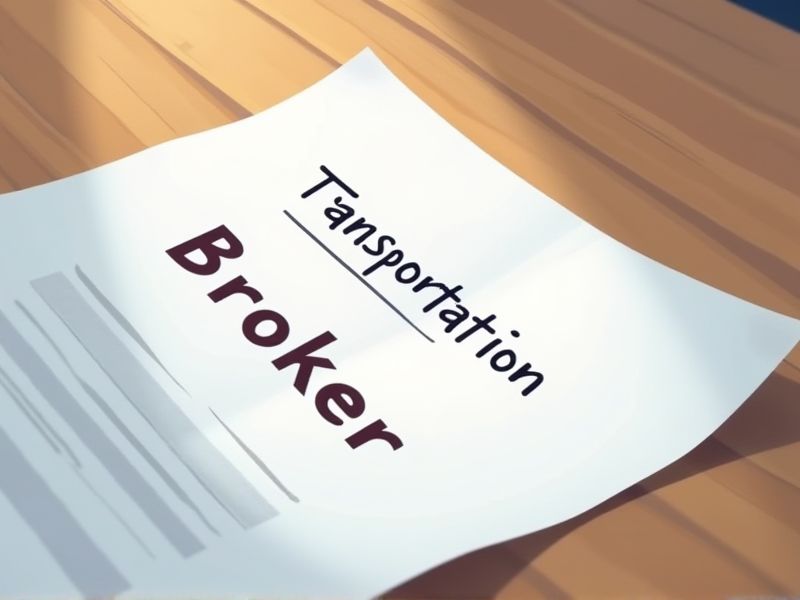
Transportation brokers manage logistics and ensure efficient movement of goods, requiring a deep understanding of regulations. Certifications provide brokers with essential knowledge related to compliance, risk management, and industry standards. They enhance credibility, demonstrating a broker's commitment to professional development. Here are some essential certifications you may need as a transportation broker.
FMCSA Freight Broker License
Obtaining an FMCSA Freight Broker License is necessary for compliance with federal regulations, as it authorizes a transportation broker to arrange the movement of freight in interstate commerce. This license ensures that brokers have the required insurance and surety bonds, which protect shippers against non-delivery or failure to pay carriers. It enhances credibility within the transportation industry by demonstrating adherence to legal standards and reliability in business operations. The license requirement also helps standardize the process of freight brokerage, promoting fair competition and safety in the logistics sector.
TIA Freight Broker Certification
TIA Freight Broker Certification provides recognized industry credibility, which leads to increased trust from potential clients. This certification often results in improved professional standards, ensuring brokers are well-versed in the regulations and best practices of the freight industry. Holding such certification can attract more clients, as it indicates a commitment to quality service. Brokers with certification tend to have a competitive advantage in the market, as they're perceived as more reliable and competent.
Certified Transportation Broker (CTB)
Certified Transportation Brokers (CTBs) provide industry-recognized credentials that enhance credibility and trust with clients and carriers, essential for building strong business relationships. Training required for CTB certification equips brokers with regulatory knowledge and best practices, leading to more efficient and compliant operations. The rigorous examination process ensures brokers possess critical problem-solving skills and up-to-date industry insights, ultimately improving service quality. The CTB designation can result in increased job opportunities and career advancement, as businesses often prefer hiring certified professionals.
Transportation Management Systems (TMS) Certification
Transportation brokers need TMS Certification to ensure efficient management and optimization of logistics operations, reducing transportation costs and enhancing service quality. Certification validates their expertise in using sophisticated TMS software, which improves their ability to track shipments and manage data effectively. As the logistics industry faces stringent regulatory requirements, trained professionals help organizations maintain compliance and minimize potential legal issues. TMS Certification instills trust among clients, signaling a broker's credibility and commitment to industry best practices.
APICS Certified in Logistics, Transportation, and Distribution (CLTD)
Transportation brokers orchestrate the movement of goods, requiring in-depth knowledge of logistics processes; the APICS CLTD certification enriches their understanding of critical logistics and distribution strategies, enhancing operational efficiency. The certification equips brokers with advanced skills in managing transportation networks, aiding in the effective coordination between shippers and carriers. By mastering inventory management and demand forecasting, brokers can optimize supply chain performance, reducing costs and improving customer satisfaction. Acquiring the CLTD credential solidifies credibility and enhances marketability, fostering trust with clients and partners.
Certified Supply Chain Professional (CSCP)
Transportation brokers require the Certified Supply Chain Professional (CSCP) credential to enhance their understanding of end-to-end supply chain operations, which leads to better decision-making and negotiation skills. This certification provides in-depth knowledge of global supply chain management and logistics, which is essential for optimizing transportation strategies. Possessing the CSCP helps brokers to build credibility with clients and partners by demonstrating a commitment to professional development and industry standards. The credential equips brokers with the skills to implement technology-driven solutions, improving efficiency and responsiveness to market changes.
Lean Six Sigma Green Belt Certification
Lean Six Sigma Green Belt Certification equips transportation brokers with specialized skills to streamline operations and reduce waste, leading to more efficient logistics management. Improved process efficiency decreases transportation costs, enhancing competitiveness in the market. Data-driven decision-making enhances route optimization, resulting in timely deliveries and increased customer satisfaction. A focus on continuous improvement fosters an adaptable and agile business environment, crucial for responding to evolving industry demands.
Hazardous Materials Transportation Certification
Transportation brokers need Hazardous Materials Transportation Certification to ensure compliance with federal regulations, reducing the risk of legal penalties. This certification provides brokers with knowledge of safe handling and emergency response procedures, minimizing the chance of accidents. Proper certification instills confidence in clients and carriers, leading to more business opportunities. It underscores a broker's commitment to safety and regulatory adherence, enhancing their professional reputation.
Customs Broker License
A Customs Broker License is essential for a Transportation Broker because it allows them to legally manage and oversee the import and export of goods through customs. This license ensures compliance with various international trade laws and regulations, reducing the likelihood of legal issues or fines. It facilitates efficient and accurate documentation processing, leading to faster movement of goods and improved service delivery. A valid license enhances credibility and trust among clients, which is crucial in a competitive global market.
Intermodal Transportation Certification
Intermodal Transportation Certification ensures transportation brokers understand the complexities of coordinating multiple modes of transit, which can lead to increased efficiency and cost-effectiveness. Brokers who are certified demonstrate a higher level of professionalism and expertise, which often translates to improved client trust and satisfaction. Without this certification, brokers might face challenges in navigating regulatory requirements associated with different transportation modes. The certification also provides a competitive advantage, as it signifies a commitment to industry standards and continuous learning.
Summary
By obtaining certifications, you enhance your credibility in the transportation industry, increasing trust with clients and partners. This increased trust can lead to more business opportunities and stronger partnerships. Certifications also equip you with specialized knowledge, making you more effective in managing logistics and transportation challenges. Consequently, your overall operational efficiency and reputation in the market are likely to improve significantly.
